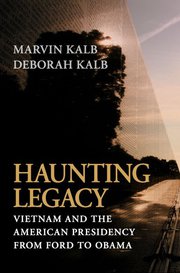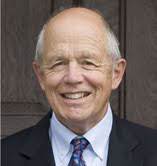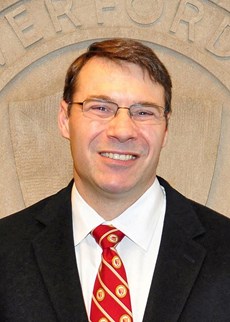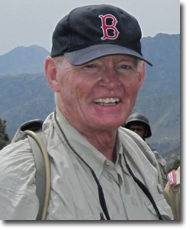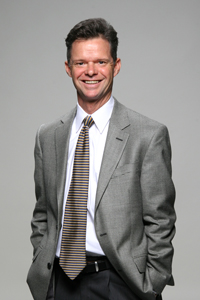 Bartholomew Sparrow, a professor of government at the University of Texas, Austin, is the author of the new book The Strategist: Brent Scowcroft and the Call of National Security.
Bartholomew Sparrow, a professor of government at the University of Texas, Austin, is the author of the new book The Strategist: Brent Scowcroft and the Call of National Security.
Q: Why did you choose to write a biography of Brent Scowcroft?
A: After I finished my book on the Insular Cases (the Insular Cases are series of landmark U.S. Supreme Court cases dating from 1901 to 1922 that made the novel distinction between the “unincorporated” and “incorporated” territories of the United States), I was considering starting a new project on how U.S. foreign policy had evolved from the Cold War through 9/11 and up to the present, given the tremendous changes that had happened over this period around the world.
I also thought about writing a historical analysis of how presidents and their advisers administer national security policy, broadly defined, given the multiple stakeholders with simultaneous interests in presidential decision-making—the State Department, Department of Defense, intelligence community, other government agencies, commercial interests, other interest groups, mobilized members of the public, and potentially others.
But as someone who had already written several books, I wanted to [address] more than political scientists if my subject was suitable to a larger audience.
Meanwhile, as someone who had followed current events since childhood and who was aware of Brent Scowcroft’s continued presence in national security politics and policy debates over the years, I wondered about writing a biography.
Although Scowcroft is a fixture in Washington, he has received only sporadic attention, most recently in the summer of 2002, when he made his famous dissent in The Wall Street Journal. And the more I read about Scowcroft, the more the idea of writing his biography appealed to me.
I had written two short stories for my nieces and nephews and had drafted a book-length simulation game for use in one of my classes, so I was reasonably comfortable with the narrative form and the conversational [tone] I wanted to adopt for a biography.
Writing a biography of Brent Scowcroft would thereby meet my several goals. It would allow me to write about the broad arc of U.S. foreign policy from the last third of the Cold War up to the 2010s. It would enable me to analyze the interagency policymaking process and the bureaucratic politics involved in the formation and execution of national security policy. And it would possibly appeal to larger national community of policymakers, historians, policy experts, and interested members of the public.
Scowcroft himself also helped me decide. Once I contacted him to investigate the possibility of his biography, contact possible through the help of several generous intermediaries, and traveled to Washington, D.C., he agreed to cooperate.
I interviewed him in his office and although he was dubious about having a biography written about him, he agreed to give me access to his high school, U.S. Military Academy, and Columbia University transcripts, his extensive Air Force personnel records, and a scrapbook with some personal clippings and photos that his mother had made for him.
He also—and this was crucial—allowed me to interview him on a regular basis. He also made it possible for me to talk to his friends, colleagues, associates, and family members. Without this cooperation, I could not have written a book anything like The Strategist, and I would have most likely postponed the project indefinitely or decided to drop it altogether.
Q: How would you describe the dynamic between Scowcroft and Henry Kissinger, with whom he worked for many years?
A: The two have been close friends ever since 1971, when Scowcroft first started working with Dr. Kissinger in his capacity as military assistant to President Nixon and Kissinger was serving as national security advisor.
Scowcroft and Kissinger shared similar views on U.S. foreign policy and international relation, both were familiar with European, Russian, and world history, and both were expert in nuclear strategy.
Although they began as boss and assistant when Kissinger hired Scowcroft as his new deputy in 1973—the former a famous Harvard University professor and author, the latter a reserved and not-well-known one-star general—their relationship became more balanced as Scowcroft acquired more experience.
It especially shifted when Kissinger became secretary of state in September 1973 and Scowcroft acquired more responsibility and then in November 1975 when Scowcroft became national security advisor (Kissinger continued as secretary of state). Scowcroft became more willing to question or disagree with Kissinger and to make independent recommendations to the president.
The two worked well together. Scowcroft’s personality almost perfectly complemented that of Kissinger, the former being steady, poised, and more straightforward, and the latter often mercurial, intemperate, and less straightforward.
They continued to work together after the Ford administration. Scowcroft helped found Kissinger Associates in 1982, and they worked together for several years until Scowcroft became national security advisor under Bush 41.
As national security advisor, Scowcroft consulted frequently with his friend, not that he, President Bush, or Secretary of State James Baker took Kissinger’s advice.
In the two decades since 1993 and the end of the first Bush administration they have kept in touch, speaking frequently by telephone, occasionally serving on the same boards and discussion panels, and seeing each at the same functions and events.
They have their differences. Scowcroft was typically more cautious on the use of force than Kissinger, as with the Mayaguez incident (where Kissinger was more intent on bombing the Cambodian mainland) and the Korean Tree incident (where Kissinger wanted the U.S. to strongly retaliate against North Korea after the killing of two U.S. soldiers on the DMZ by North Korean soldiers). Scowcroft usually preferred more measured, more muted responses to foreign policy crises.
They disagreed on going to war against Iraq in the aftermath of 9/11, an occasion where Kissinger essentially supported the George W. Bush White House.
They also conflicted over the desirability of publicly advocating total nuclear disarmament, a goal George Shultz, William Perry, Sam Nunn, and Kissinger proposed in a January 2007 Wall Street Journal editorial.
Scowcroft regarded such a goal as unrealistic, dangerous, and counterproductive, given the availability of nuclear weapons and the false hopes that such an appeal raised (since as a practical matter it would be foolhardy for the United States to eliminate its entire nuclear arsenal).
Notwithstanding these and other differences, they are very close and view each other with a great deal of mutual affection and respect.
Q: You write, “The defeat [in Vietnam] scarred Scowcroft and his colleagues...” How did the outcome in Vietnam affect Scowcroft's thinking when it came to future foreign policy decisions?
A: The experience of living through and then being involved with the Vietnam War taught Scowcroft several lessons. One was that the White House had to bring Congress along when making U.S. foreign policy—or at least not alienate important members of Congress—if U.S. foreign policy was to be effective.
As the chair of The President’s Commission on Strategic Forces of 1983 (also known as the Scowcroft Commission), Scowcroft consulted closely with members of the House of Representatives, especially Democratic up-and-comers Les Aspin and Al Gore. To everyone’s surprise, he and his fellow commissioners were able to get the MX deal through Congress.
Later, Scowcroft worked extremely hard and ultimately successfully to persuade more than a third of the Democratic-controlled Senate from overriding Bush’s presidential vetoes on several occasions, which meant persuading members from across the aisle.
But he was able to do this because he often breakfasted with members of Congress and otherwise met with them to exchange views. His own personal credibility also helped immensely.
The fact that he faced Democratic-controlled Congresses in both the Ford and first Bush administration meant that he often disagreed with congressional leaders, but he tried to keep the avenues of communication open.
The United States’ failure in Vietnam also made Scowcroft realize how important successful relations with the press were. An administration’s foreign policy could not be sustained unless it were presented and explained to the larger policy community and the American public, and close relations between the White House and the press made this possible.
So when he became national security advisor Scowcroft often spoke to chief correspondents in the national media, usually on background, and often met with small groups of reporters from different publications and media groups to explain the White House’s perspectives. After he left office, he wrote dozens of op-eds and gave numerous interviews.
The Vietnam War and the Mayaguez incident revealed something else: the importance of inter-service cooperation among the Army, Navy, Air Forces, and Marines, in light of the coordination problems during the Vietnam War and then the U.S. military’s response to the Cambodian seizure of the Mayaguez merchant ship in May 1975.
Scowcroft, along with others, worked with General David Jones to see to the eventual passage of the 1986 Goldwater-Nichols Act for centralizing and clarifying the U.S. armed forces command structure and improving joint service operations.
Perhaps the most important lesson of Vietnam was that the United States had to think through foreign engagements and to consider the larger strategic implications of any policy initiative and the United States’ long-term interests. Scowcroft did not believe U.S. policymakers had ever thoroughly thought through the dimensions and implications of the Vietnam War.
So when the new Bush administration took office in 1988 and faced the social revolutions in Eastern Europe, the later collapse of the Soviet Union, and Iraq’s invasion of Kuwait, Scowcroft, Bush, Baker and their advisers carefully thought through what their ultimate objectives were and how they wanted to proceed.
Q: You begin the book by describing Scowcroft's op-ed piece in the Wall Street Journal in August 2002 arguing against a U.S. invasion of Iraq. Why did you decide to open the book with this incident, and what impact did the op-ed have?
A: One reason was to show Scowcroft’s courage by dissenting in public against the standing president of the United States, someone who he knew well and who happened to be the son of his dear friend, George H.W. Bush.
At the time, moreover, Scowcroft was serving as the chair of the President’s Foreign Intelligence Advisory Board (PFIAB), appointed by President Bush in early 2001.
Scowcroft also showed courage by writing “Don’t Attack Saddam” because the op-ed questioned the judgment of several of Bush 43’s top advisers, several of whom were friends and associates of Scowcroft’s dating back to the first Bush administration.
And he paid a price for the dissent: for more two years following his op-ed, Scowcroft was shunned by those in the administration and fellow Republicans.
Another reason for beginning with this episode was to signal the biography’s timeliness, since the decision to invade Iraq turned out to be the point of departure for an extraordinarily destructive and costly chain of events, the effects of which clearly remain with us to this day.
A third purpose was that Scowcroft’s writing the op-ed evoked a central theme of the book: the importance of the NSC process—that is, the way that diplomacy, intelligence, the military, and other dimensions of policymaking, such as finance and public relations, are harnessed, coordinated, and directed by American presidents and their staffs.
The fact that Scowcroft felt he had to write the op-ed speaks to the problems in the quality of the White House policy process. Virtually all of the Bush administration’s high-ranking officials—George W. Bush almost certainly included—already knew Scowcroft’s position on an invasion of Iraq, given the paltry evidence that Saddam Hussein possessed WMDs and had close ties to Al Qaeda.
The op-ed further points to the remarkable longevity of Scowcroft’s career. At the age of 77 he was able to start a national debate about the wisdom of using force against the Iraqi regime and discussion in the press about a possible rift within the Republican Party.
For a short while, Scowcroft and others who then also spoke out against going to war on Iraq were able to halt the momentum towards precipitous action and deposing Saddam Hussein.
Finally, the fact that Scowcroft wrote the op-ed indicated his deep patriotism—the fact that he was willing to face the ostracism of the White House and many Republicans and neoconservatives given how strongly he felt that war against Iraq ran contrary to the United States’ longer term interests.
In fact, Scowcroft has been almost continually involved in national security policy since the mid-1970s. He is the writer (or co-author) of over a hundred op-eds in major media outlets on occasions where he felt his voice was needed; he has been a chair, co-chair, or member of over a dozen important commissions; and he has been a confidant and adviser to numerous government officials and even several U.S. presidents over the past few decades.
In this sense, the op-ed is somewhat misleading: not only did Scowcroft write many, many op-eds (several others in the months after the September 11 attacks, in fact), he usually stayed behind the scenes, proceeding privately and discreetly.
Besides evoking a short-lived debate over the merits of attacking Iraq and making Scowcroft a persona non grata in the Bush White House for a few years and turning other leading Republicans, neoconservatives especially, against him, the op-ed made more Americans aware of Scowcroft.
Given how the wars in Iraq and Afghanistan played out, more people in Washington and around the country became more appreciative of a more restrained and more practical U.S. foreign policy.
Q: You describe the close working relationship between Scowcroft and George H.W. Bush. How did Scowcroft's relationship with the first President Bush differ from his dealings with George W. Bush?
A: George H.W. Bush and Scowcroft are exceptionally close and they share many of the same values. They admire, respect, and wholly trust each other.
Their friendship dates back to when Bush was chairman of the National Republic Party and Scowcroft was serving as deputy national security advisor under Nixon.
They have many of the same experiences, growing up during the Second World War and both were pilots, Bush with the Navy and Scowcroft with the Army Air Corps.
They were both pragmatic internationalists who believed…that personal relationships among heads of state and top officials was crucial for the international system, that the United States needed to create strong working relationship with the People’s Republic of China, and that the U.S. interests were best served by policymakers taking a long-term perspective and by working as much as possible with international institutions, such as NATO, the United Nations, the World Bank, and the WTO (formerly GATT).
Scowcroft sent the senior Bush a copy of his Wall Street Journal op-ed before it came out, for example, so his friend—who shared his doubts about the wisdom of attacking Iraq—would not be surprised by reading the op-ed in that Wednesday’s paper or learn of it second-hand.
Scowcroft liked and got along well with George W. Bush (21 years his junior), but they disagreed on foreign policy, differed temperamentally, and contrasted stylistically.
Whereas Scowcroft and the senior George Bush were polite, polished, respectful of other foreign leaders, genteel, and cautious as leaders, the younger Bush was often brash, abrupt with others, impatient with international diplomacy, and zealous.
The younger Bush believed that his father had failed in important ways: leaving Saddam in power; losing the Republican right in the House of Representatives in 1990; and being defeated in his bid for reelection.
And Scowcroft, as his father’s right-hand man, was partly responsible for his father’s mixed record as president in George W. Bush’s eyes—with Bush 43 saying during his election campaign that he wanted nothing to do with either Scowcroft or James Baker once he was president.
Although Scowcroft never spoke to me directly of his relationship with George W. Bush, I think it is clear that he regarded the younger Bush as inexperienced on foreign policy, unreflective and incurious, and ideological—and ultimately as teachable.
So even though Bush 43 rejected Scowcroft’s advice in 2002 and dismissed him as the chair of PFIAB in 2004, the former national security advisor worked extensively with the administration’s foreign policy advisers—Condoleezza Rice, Stephen Hadley, and, later, Robert Gates—in Bush’s second term in office.
Q: What are you working on now?
A: I continue to be interested in the interplay between the United States and the world, but I am now going back in time, to colonial America and the founding of the United States.
A colleague and I are researching the significance of the fact that more than half of the European immigrants who arrived in the British North American colonies arrived as unfree workers.
These were indentured servants, a population that included those unable to pay for their passage over, exiled political prisoners, people who were kidnapped or “spirited” from coastal towns and cities, and about 50,000 convicted felons who chose to be transported to New World rather than be hanged.
Ship captains would then sell these indentured servants and others into bondage upon arriving on American shores, where they would typically spend four to seven years as forced labor.
Although British, American, and Australian colonial historians are well [aware] of this population, those who write of the politics of the founding essentially ignore class.
Because almost all of this population and their descendants were illiterate, without appreciable property, and located diffusely, they do not have a large presence in American history and our goal is to uncover the effect this population had on the politics of the founding era (1776-1789) and the early United States.
Q: Anything else we should know?
A: Scowcroft should be viewed as one of the most influential people in the history of U.S. national security policy and as probably the most trusted “wise men” of the late 20th and early 21st centuries, even though he is known to few outside Washington.
A study of his career—and the contrast between his example and those of other national security advisors and other officials involved in making national security policy—reveals just how much each individual on the president’s foreign policy team matters.
His career shows just how important the quality of the interaction and chemistry is among a president’s principal advisors, and just how critical the relationship is between the president and the national security advisor.
This is a relationship analogous to the relationship the president has with the chief of staff with respect to domestic politics and policy.
But because decision-making in foreign policy is usually more centralized than that of domestic policy, the president’s relationship to the national security advisor is even more determinative of major decisions with respect to U.S. foreign policy.
--Interview with Deborah Kalb. This Q&A also appears on deborahkalbbooks.blogspot.com.
 Tuesday, February 10, 2015 at 9:22AM
Tuesday, February 10, 2015 at 9:22AM 
